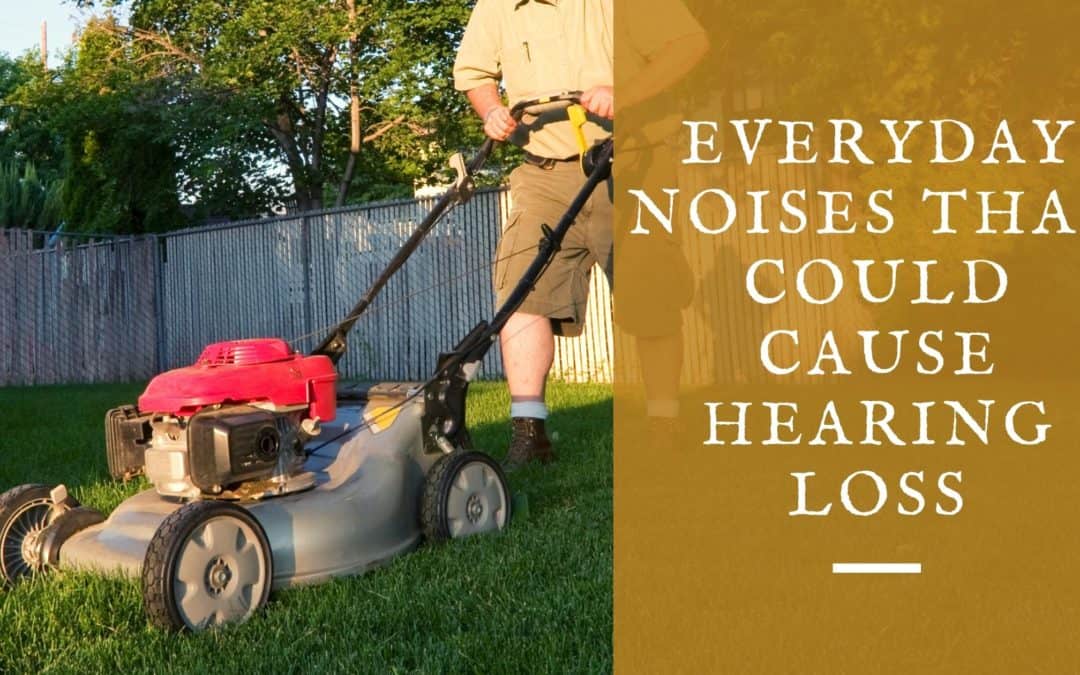Did you know that hearing loss is one of the most common health conditions that people experience today? Nearly 2 in 10 adults between the ages of 20 – 69 have some degree of hearing loss according to the Centers for Disease Control and Prevention (CDC). Impacting over 48 million people, impaired hearing is a pervasive health issue. One of the most common causes of hearing loss is exposure to loud noise. Though you may be thinking of loud noise like fireworks and extremely loud music, there are everyday noises that are hazardous for hearing health.
Noise-Induced Hearing Loss
One-time or regular exposure to loud noise can take a toll on integral components of the auditory system – the sensory system for hearing. Loud noise can damage the hair cells in the inner ear which provides an essential function for processing sound. These sensory cells help convert incoming soundwaves into electrical signals. The auditory nerve carries these signals to the brain where they are further processed and assigned meaning to. This is what allows us to understand the speech and sound we hear.
Loud noise can cause these hair cells to lose sensitivity, work less, and die over time. These hair cells, unlike other types of cells we have, do not regenerate. Humans are born with all the hair cells in the inner ear that we will ever have (thousands in each ear). There are also no medical treatments that can regenerate these cells or correct any harm. This means that any damage is permanent, resulting in chronic hearing loss.
How Loud is Too Loud?
So what exactly counts as excessive noise anyway? Well, the sound is measured in decibels, and noise above 85dB can potentially affect hearing. This is likely not as loud as you think – 85dB is the equivalent of heavy traffic or a noisy restaurant. Experts suggest that exposure to 85dB for 8 hours per day is the threshold for safe listening. This means that exceeding can be dangerous for hearing health if precautions are not taken.
The Occupational Health and Safety Administration (OHSA) outlines that the exposure time to noise above 85dB should be reduced by half for every increase of 3 decibels. Their guidelines for safe listening include:
- 85dB: 8 hours
- 88dB: 4 hours
- 91dB: 2 hours
- 94dB: 30min
Being exposed to higher volumes of noise for longer periods can permanently damage hair cells in the inner ear, causing chronic hearing loss.
Everyday Noises that Can Cause Hearing Loss
While you may be thinking that it takes excessive noise to cause this kind of damage to the hearing system, there is a wide range of seemingly ordinary sounds that can impair hearing. This includes:
- Household appliances: various appliances and household items that are part of your daily life produce sound above 85dB. This includes:
- vacuum cleaner, lawnmower, hairdryer: up to 90dB
- blenders, juicers, food processors: up to100dB
- power tools (power drills, chainsaw, etc.): up to 110dB
- Headphones: over-ears headphones and earbuds, depending on the specific type, can reach up to 100dB on their highest volume setting.
- Social activities: various types of social activities involve being in environments with lots of background noise. Examples of a few social activities that produce noise above 85dB include: being in a noisy restaurant or bar (85-90dB) watching a game in a sports stadium or being at a concert in an arena (up to 100dB).
- Commuting: driving in heavy traffic or commuting on trains can reach up to 90dB.
These daily activities or items we use can affect hearing over time which is why it is important to practice the necessary measures to protect hearing health.
Tips to Protect Your Hearing
There are numerous ways you can reduce your risk of developing noise-induced hearing loss which is completely preventable. A few simple tips include:
- Wear hearing protection like noise-canceling headphones, earbuds, or earmuffs.
- Reduce your exposure to loud noise by keeping the volume on lower settings on your electronic devices.
- Take listening breaks throughout the day where you are not exposed to loud sources of noise.
- Have your hearing tested regularly so that you are aware of your hearing needs and any changes that you may experience?
Contact us to learn more about how you can prioritize your hearing health. Schedule an appointment for a hearing consultation today.

